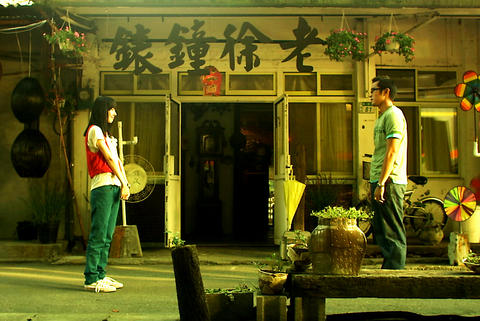Female film directors are on the rise in Taiwan, as evidenced by two Mandarin movies released today. My DNA Says I Love You (基因決定我愛你), Lee Yun-chan's (李芸嬋) second movie, and Keeping Watch (沉睡的青春), Zheng Fen Fen's (鄭芬芬) first, both offer romantic stories starring local pop stars. Although the themes of both movies are similar, the directors have achieved different levels of success.
In My DNA Says I Love You, new technology makes it possible to alter the human body and personality through genetic manipulation. Gigi, played by Terri Kwan (關穎), who works at a bio-technology company that researches and markets gene-altering drugs, is plagued with a "clean-freak" gene. Her boyfriend, Anteater – played by Peter Ho (何潤東) -- is a slob. In order to maintain the relationship with the man she loves, she takes untested gene-altering drugs. The drugs are effective in modifying her behavior, but her drug cabinet becomes cluttered with additional drugs to control the side effects.
Marlene, played by Yu Nan (余男), works at the same company. Her problem, however, is physical: an obesity gene. She begins taking the physique-controlling pills that she promotes and likes the results. However, the drugs are recalled. The agitated scientist resorts to a strict diet to keep her figure, which is much admired by her corporate, globe-trotting lover. Stressed, Marlene becomes increasingly irritable toward her secret admirer Teddy (Eddie Peng, 彭于晏).

PHOTOS: COURTESY OF JOINT ENTERTAINMENT INTERNATIONAL
The movie follows these two women's lives through their struggles and their ultimate discovery of the true meaning of love.
Lee's second attempt at filmmaking, following The Shoe Fairy (人魚朵朵) in 2005, is blessed with pop stars who bring life and sparkle to the movie and an international production team. It has a clean, glossy look that appeals to all. Yet, despite the concept, the plot of My DNA Says I Love You is convoluted. At times it feels more like a TV mini-series than a feature film.
Keeping Watch, filmed at historic sites such as the secluded Pinghsi railway line (平溪), the wooden Chintung train station (菁桐) and Lo Sheng Sanatorium and Military Dependents' Village, is a touching story of a loner, Ching, played by Haden Kuo (郭碧婷). A young woman with a drunkard father and runaway mother, Ching single-handedly runs the family's dilapidated clock shop.

PHOTO: COURTESY OF SERENITY ENTERTAINMENT INTERNATIONAL
A young man who calls himself Han, played by Joseph Chang (張孝全), claims to be her high school classmate. Ching eventually falls in love with him, breaking out from her solitary life.
Until one day Han disappears. This leads Ching to his parent's house, where she discovers that their son has been dead for years. The man she had fallen in love with is, in fact, Han's high school friend Yu, who is schizophrenic and sometimes takes on the personality of his deceased friend.
Yu escapes from the mental asylum and returns to the place where the story begins.

In contrast with other movies targeting teens, love is illuminated with tenderness and subtlety and gradually unfolds as a ritual of healing for those who are caught in the past with memories of grief and remorse.
The visuals are expressively poetic, echoing Yu's seclusion in an old sanatorium that is destined to pass into oblivion with time, and Ching's lonely life by the railway, where faceless travelers come and go without leaving a trace.
Chang pulls off the lovable schizophrenia with subtle nuances and body language and the model-turned-actress Kuo brings the introverted loner to life with grace and charm.
It is often said that the new generation of local filmmakers lacks the ability to tell a good story; however, as screenwriter and director, Zheng stands out with a well-constructed narrative, lyric visual vocabulary and a unique sensibility highlighted in the fairy tale scenes.

Aug. 4 to Aug. 10 When Coca-Cola finally pushed its way into Taiwan’s market in 1968, it allegedly vowed to wipe out its major domestic rival Hey Song within five years. But Hey Song, which began as a manual operation in a family cow shed in 1925, had proven its resilience, surviving numerous setbacks — including the loss of autonomy and nearly all its assets due to the Japanese colonial government’s wartime economic policy. By the 1960s, Hey Song had risen to the top of Taiwan’s beverage industry. This success was driven not only by president Chang Wen-chi’s

Last week, on the heels of the recall election that turned out so badly for Taiwan, came the news that US President Donald Trump had blocked the transit of President William Lai (賴清德) through the US on his way to Latin America. A few days later the international media reported that in June a scheduled visit by Minister of National Defense Wellington Koo (顧立雄) for high level meetings was canceled by the US after China’s President Xi Jinping (習近平) asked Trump to curb US engagement with Taiwan during a June phone call. The cancellation of Lai’s transit was a gaudy

From Godzilla’s fiery atomic breath to post-apocalyptic anime and harrowing depictions of radiation sickness, the influence of the nuclear bombings of Hiroshima and Nagasaki runs deep in Japanese popular culture. In the 80 years since the World War II attacks, stories of destruction and mutation have been fused with fears around natural disasters and, more recently, the Fukushima crisis. Classic manga and anime series Astro Boy is called “Mighty Atom” in Japanese, while city-leveling explosions loom large in other titles such as Akira, Neon Genesis Evangelion and Attack on Titan. “Living through tremendous pain” and overcoming trauma is a recurrent theme in Japan’s

As last month dawned, the Democratic Progressive Party (DPP) was in a good position. The recall campaigns had strong momentum, polling showed many Chinese Nationalist Party (KMT) lawmakers at risk of recall and even the KMT was bracing for losing seats while facing a tsunami of voter fraud investigations. Polling pointed to some of the recalls being a lock for victory. Though in most districts the majority was against recalling their lawmaker, among voters “definitely” planning to vote, there were double-digit margins in favor of recall in at least five districts, with three districts near or above 20 percent in